About This Clip
Othello
Othello
19-20 Temmuz, 20.30 – 21 Temmuz, 18.00 (Son Oyunlar)@canercindoruk @ilayerkok @k_aydoganBilet almak için🔻https://t.co/VpBKmpp9yS#othello #canercindoruk #modasahnesi pic.twitter.com/0i7zhQFPYY
— moda sahnesi (@modasahnesi) July 18, 2024
A Turkish Othello Reshapes the Adaptive Canon in Istanbul.
As the sweltering and humid July evening in Istanbul transitions into night, it sets the stage for another Turkish adaptation of Shakespeare’s play, Othello, at the main hall of Moda Sahnesi (Moda Stage), one of the city’s modern cultural attractions. The company is named after its location, Moda, a small town on the Asian side of the city renowned for its bohemian and cozy ambiance. It offers a wide range of cultural activities, including concerts and exhibitions. Moda Stage serves as both the venue and the production company. This is the company’s second new Shakespeare adaptation currently showing in theaters, following Taming of the Shrew (2022), also directed by Kemal Aydoğan.
It is crucial to remember that Othello stands out as one of the most relevant Shakespearean plays for modern audiences, particularly due to its exploration of gender and race in its subplots. On top of that, the play’s setting in Cyprus adds significant and captivating elements for the modern Turkish audience.
The Turkish reinterpretation introduces rich metatheatrical layers as it curtails the original cast down to seven characters featuring Othello (Caner Cindoruk), Desdemona (İlay Erkök), Iago (Ahmed Saka), Cassio (Mert Şişmanlar), Emilia (Seray Akülker), Roderigo (Mesut Karakulak).
The biggest surprise comes with the inventive addition of a jovially mercurial, highly protean, anonymous narrator performed by the brilliant Yılmaz Sütçü. He functions as an intermediary character as well as four different characters: Lodovico, Montano, the Messenger, and, surprisingly, Bianca, the prostitute from the source text. This narrative style, reminiscent of traditional dynamics, has been a favorite tool of Turkish directors adapting Shakespeare. However, Moda Stage’s portrayal is a complete reimagining. Even before the audience enters the hall, Sütçü greets them at the entrance with a mini live concert featuring Turkish classical music. One of the songs goes, “I envy you / I envy you from my own heart / Oh, what torment this love brings, dear God / I am overwhelmed by my own suffering.” Another song features the lyrics, “Has our love been a lie all these days? Close, close the curtains; this comedy is over.” The familiar tunes surprise the audience, making them question if they are in the right show, and humorously introduce the themes of jealousy, disloyalty, and betrayal.
The play begins without a fourth wall as Sütçü engages with the audience, posing questions about history, such as the location of the Maghreb, Florence’s notable aspects, and Eurocentrism. The recharged Sütçü tells political jokes, touching on local politics and bringing up the slogan “No war.” He narrates events humorously in Venice and then shifts the story to Cyprus before calling the remaining characters on stage.
His portrayal of Bianca, dressed in a beach pareo, a bikini top, flip-flops, a funky wig, and speaking with a Turkish Cypriot accent, triggers a roar of laughter as he uses exaggerated, obscene language. However, also on another level, he boldly challenges traditional gender norms and binaries. It should be noted that the play’s rewriting strategies are based on the magic of this intermediary character, combining lively elements of the conventional Turkish theatrical narrator Meddah and Brechtian alienation.
The play follows the familiar plotline of the original script, translated by Emine Ayhan’s renewed perspective on the Early Modern spirit and Shakespeare. The source play becomes more engaging with relocalized touches as Iago shaves Othello’s beard in the style of a traditional Turkish barber, prompting giggles from the audience as the barber’s black towel reads Othello. On a different note, the entrepreneurial spirit in Turkey has also ventured into Shakespeare’s tragedy. A bedding brand called Othello has existed for years, and its witty slogan ironically translates to “Wake up to life.”
The set incorporates key elements to capture the essence of the play. On both sides of the stage, there are dress forms displaying incomplete garments. Video art is projected onto stacked black cardboard boxes to create a multimedia wall in the center backstage. At the top of the box wall, masts of ships are positioned to evoke the maritime battle of the original script. The director opted for the actors to remain seated at the sides of the stage rather than exiting, ready to transition seamlessly into their roles when needed. The costume selections are modern and stationary. Male actors are primarily dressed in military camouflage, while Desdemona wears an evening gown with a low neckline, and Emilia opts for a more modest dress.
Othello reinterpretations in Türkiye have rightfully brought forth the issue of violence against women by a patriarchal mindset and its enduring presence in our current epoch. The final scene at Moda Stage evokes powerful, thought-provoking, and cathartic moments as Othello destroys the black boxes that make up the background wall with fiery anger. The suspenseful music heightens the tension as he finally grabs Desdemona’s neck from behind and smothers her (but not with a pillow). This final scene, depicting the destruction of the brick wall, could be seen as symbolizing the self-destructive nature of male supremacy.
There is yet another surprise when the chameleonic actor Sütçü appears half-naked and utters in a very serious, confident, and stern tone, “The comedy, the play is over! Well, did we have fun?” (Othello, 2024). He introduces an intertextual erudition by quoting Walter Benjamin’s “On the Concept of History,” in which Benjamin famously elaborates on Paul Klee’s painting Angelus Novus (often referred to as Angel of History). The surreal, haunting angel with wide, fearful eyes, outstretched wings, and spiky hair inspires Benjamin’s catastrophic, tumultuous history and its inevitably dark perception of the future. It is genuinely impactful when Sütçü, while quoting Iago, “I bleed, sir, but not killed,” lets out a sinister laugh (5.2.293). The sound echoes throughout the entire hall, sparking a profound moment of contemplation.
Using traditional techniques, local motifs, and thought-provoking intertextuality laden with philosophical reflections, Moda Stage’s Othello could establish a new standard in the realm of adaptations on the Turkish stage.
REFERENCES
Shakespeare, W. (2024). Othello. (K. Aydoğan, Director, C. Cindoruk, Y. Sütçü, İ. Erkök, & A. Saka, Performers) Moda Sahnesi, İstanbul.
Shakespeare, W. (1991). Othello. In S. Wells & G. Taylor (Eds.), The Complete Oxford Shakespeare (p. 293). New York: Oxford University Press. (Original Work Published 1594)
Cast: Caner Cindoruk, Yılmaz Sütçü, Mert Şişmanlar, İlay Erkök, Seray Akülker, Ahmed Saka, Mesut Karakulak
Production Team
Director
Kemal Aydoğan
Stage Design
Bengi Günay
Music
Dengin Ceyhan
Lighting Design
İrfan Varlı
Conditioner, Choreography
Dilan Intense
For more information, visit Moda Sahnesi.
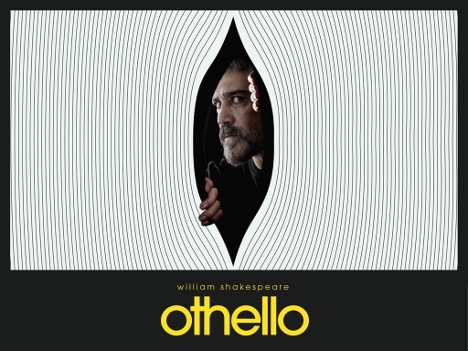
Image of Othello (Caner Cindoruk) by Moda Sahnesi
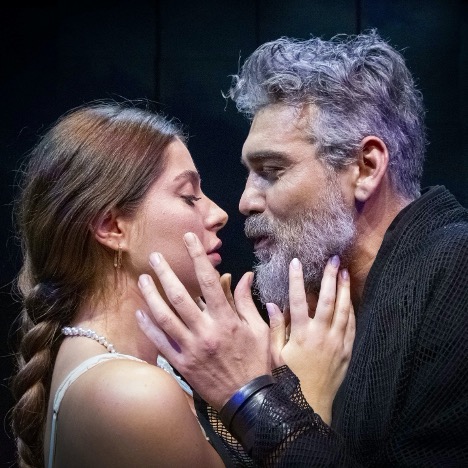
Image of Desdemona and Othello (Caner Cindoruk) by Moda Sahnesi
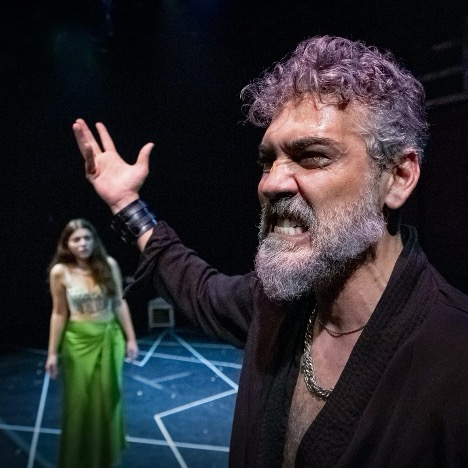
Image of Othello by Moda Sahnesi

Image of the protean narrator (Yılmaz Sütçü) by Tek Perde
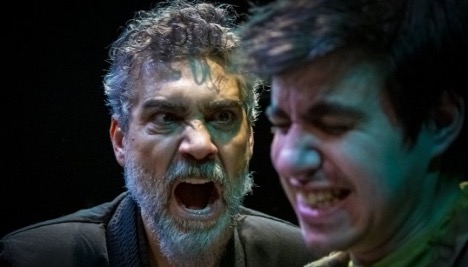
Image of Othello (Caner Cindoruk) and Ahmed Saka (Iago) by Tiyatro Online
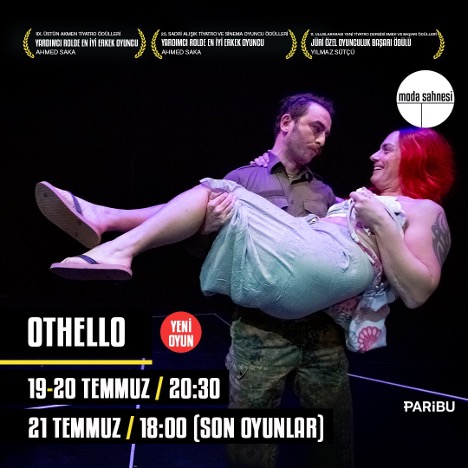
Image of Cassio (Mert Şişmanlar) and Yılmaz Sütçü (Bianca) by X.
Production notes provided by Burak Urucu, Istanbul University-Cerrahpasa.
Othello
Related Productions
- 7 Şekspir Müzikali (7 Shakespeares Musical) (Aydoğan, Kemal; 2009-2011)
- Moore – a Pacific Island Othello (Taft Mattos, Justina; 2020)
- Otelo (Othello) (Ríos, Claudia; 2009)
- Othello (Perng, Ching-hsi)
- Othello: A Play in Black and White (Abel, Roysten; 1999)




